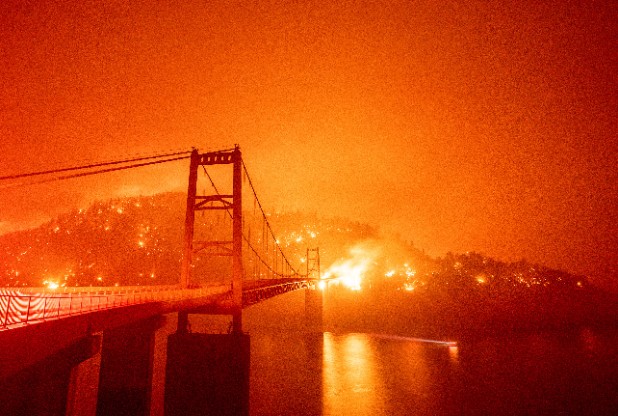
JOSH EDELSON / AFP
“Unprecedented” wildfires fueled by strong winds and searing temperatures were raging cross a wide swathe of California, Oregon and Washington on Wednesday, destroying scores of homes and businesses in the western US states and forcing tens of thousands of residents to evacuate.
In California, where at least eight deaths have been reported, National Guard helicopters rescued hundreds of people trapped by the Creek Fire in the Sierra National Forest.
The National Guard released video footage of rescued campers as they disembarked from a CH-47 Chinook helicopter wearing hiking clothes and toting backpacks. Some had pet dogs on leashes.
In Oregon, Governor Kate Brown declared the fires in the northwestern state to be a “once-in-a-generation event.”
“Almost every year since becoming governor, I’ve witnessed historic fire seasons,” Brown said. “This is proving to be an unprecedented and significant fire event for our state.”
Jay Inslee, the governor of neighboring Washington state, described the wildfires as “unprecedented and heartbreaking.”
Inslee, who campaigned for the Democratic nomination for president on a platform of battling climate change, and California Governor Gavin Newsom both blamed the effects of a changing climate for the exceptional ferocity of this year’s blazes.
“I quite literally have no patience for climate change deniers,” Newsom said. “It’s completely inconsistent, that point of view, with the reality on the ground.”
As for Inslee, he said that “we’re living in a new world — this is not the old Washington.
“The conditions are so dry and are so hot because the climate has changed,” the governor said. “The devastation is all over our state.”
Inslee said 330,000 acres (133,500 hectares) of land had burned in Washington on Monday alone, more in a single day than in 12 of the last 18 fire seasons.
– ‘Driving through hell’ –
Jody Evans, a resident of the town of Detroit in Oregon, fled her home as the fire approached.
“Coming through fire on both sides, trees down, wind blowing, ash flying,” Evans told Newschannel 21. “It was like driving through hell.”
The town of Malden in Washington state was nearly totally razed, with 80 percent of its buildings including the fire station, post office and city hall “completely burned to the ground,” the local sheriff said in a statement.
“The scale of this disaster really can’t be expressed in words,” said Sheriff Brett Myers. “The fire will be extinguished but a community has been changed for a lifetime.”
More than 170,000 Californians were left without electricity as utility company PG&E enacted a “last resort” shutoff across large swathes of the state due to the extreme wildfire threat.
Gusty winds and temperatures of more than 100 degrees Fahrenheit (37.7 degrees Celsius) were hampering the efforts of the thousands of firefighters battling the blazes in California.
In California, more than 14,000 firefighters are fighting 25 major wildfires across the country’s most populous state.
The Creek Fire has ripped through more than 140,000 acres and was zero percent contained Tuesday.
Wildfires spread rapidly over the Labor Day holiday weekend, which saw a record 121-degree Fahrenheit (49 degrees Celsius) temperature recorded in Los Angeles County.
Santa Ana winds were expected to strengthen through to Wednesday morning, with gusts of 55 miles (88 kilometers) per hour.
“We simply do not have enough resources to fully fight and contain every fire,” said Randy Moore, regional forester for the Pacific Southwest Region.
California has seen more than 7,600 fires this year which have burned more than 2.2 million acres — an annual record, with nearly four months of fire season still to come.
Last year, there were nearly 5,000 fires which burned 117,586 acres, according to Cal Fire.
© Agence France-Presse
